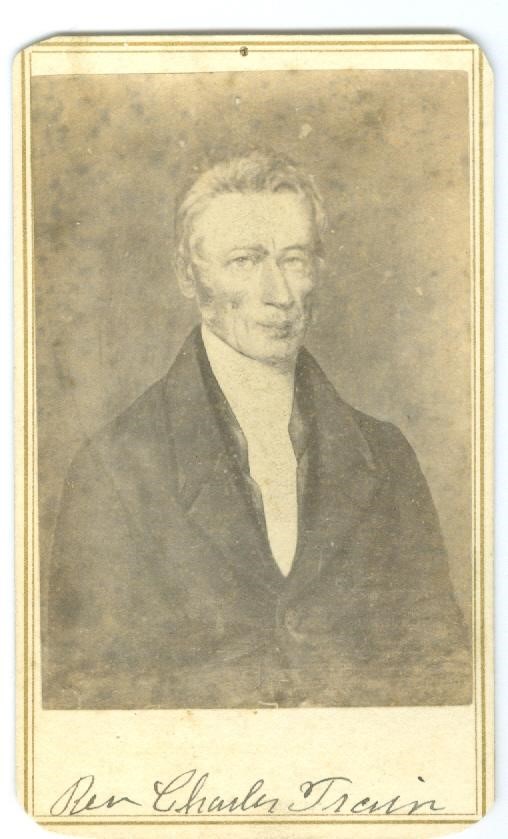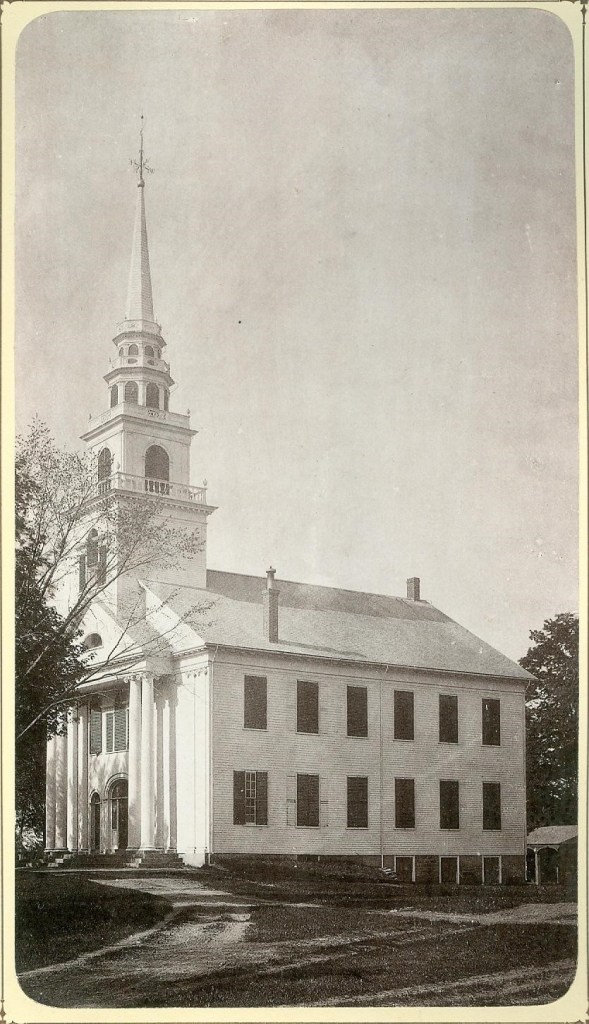The Reverend Charles Train (1783-1849) was the minister of the First Baptist Church of Framingham for twenty-nine years. He was born in Weston, Massachusetts to Deacon Samuel Train and Deborah (Savage) Train on January 7, 1783. Charles was educated in the local Weston Schools until the age of seventeen.He then attended the Framingham Academy for one term in preparation for college. During the summer of 1800, he completed his college course preparation under the tutelage of the Reverend Samuel Kendall, D. D.
Charles entered Harvard College in the fall of 1801. He was a gifted speaker and had excellent reasoning skills which he knew would serve him well in his chosen career, law.

Financing his education proved to be difficult. His father was a farmer of modest means who relied upon Charles to help out on the farm. Thus, the family was not able to offer much financial assistance to Charles. To raise money to pay for his college tuition, Charles taught school during the winter months, and he occasionally worked in the Probate Office.
Charles desire to enter the legal profession began to waiver in 1803, when he experienced a call to religious life. During his last two years at Harvard, Charles wrestled with the decision to answer this call. He finally came to accept it and began preparations for life as a Baptist minister. In May of 1806, he preached his first sermon at the Baptist Church in Newton. After which he received a letter of license to preach the Gospel from the Newton church. For the next seven months, Charles continued his religious studies with the Reverend Joseph Grafton while working as a substitute preacher in the area Baptist churches. To earn extra money, he continued to teach school during the winters of 1805 and 1806. Eventually Charles left the Newton congregation and returned home to preach to the Baptists in Weston.
In the fall of 1807, Charles was offered the directorship of the Framingham Academy. He accepted the position which he held until 1809. The Academy thrived under his leadership.
While director of the Framingham Academy, Lieutenant Jonathan Maynard nominated Charles for membership in Middlesex Lodge of Freemasons. On January 31, 1809, Charles was accepted and became an active member of the society. He was appointed the first chaplain of the Lodge, a position he held until 1826. He also served two years (1817, 1818) as the Worshipful Master of the Lodge. Being an excellent public speaker, Charles was frequently asked to address many Masonic gatherings.
During this time, he was also preaching in Framingham and Weston on alternate Sundays. Charles worked hard to strengthen and grow these two small congregations. The Framingham church consisted of only twenty families who worshipped in a dilapidated old meeting house in Park’s Corner. On January 30, 1811, he was ordained in Framingham at the request of the two congregations. In July of that same year, the two churches united and became known as the Baptist Church in Weston and Framingham. By 1826, under Charles’ leadership, the Framingham branch grew to about one hundred members, while the Weston branch had forty. At this time, the two congregations went their separate ways. Charles remained in Framingham to minister, a position he held until 1839.
The need for a new church building was great, given the tremendous increase in the size of the congregation and the physical condition of the meeting house. Land was purchased in Framingham Centre from Captain Peter Johnson and William Buckminster. Plans for the building were drawn up by Solomon Willard, a Boston architect. On November 17, 1825, the cornerstone for the new meeting house was laid with Masonic honors by the Freemasons of the Middlesex Lodge. In January 1827, the congregation moved from the old meeting house in Park’s Corner to their new building. Today, the First Baptist Church is the oldest public building in Framingham.

The Reverend Train was a well respected member of the Framingham community. In addition to his pastoral duties, he was active in state and local affairs. Charles was very interested in education. For many years, he served as a member of the Framingham School Committee and was a trustees of the Framingham Academy. After he resigned the directorship of the Academy in 1809, he continued to offer college preparatory courses to students at his home. Charles also served in the State Legislature. He was elected to the House of Representatives in 1822 and served for six of the next seven years. Charles lost his House of Representative re-election bid in 1827 after preaching a few very uncompromising sermons on the subject of Temperance which did not set well with the electorate! In the winter of 1829, he was asked to fill a vacancy in the Senate, and was subsequently elected to the position the following year. While serving in the legislature, he championed the formation of a Legislative Library, the revision of the laws regarding the Common Schools, and was involved in obtaining the charter for Amherst College.
Charles married Elizabeth Harrington of Weston on August 15, 1810. Together they had one son, Arthur Savage Train who followed in his father’s footsteps, and became a minister. Elizabeth died on September 14, 1814 at the age of thirty. In 1814 or 1815, Charles built a home in Park’s Corner, where he farmed about thirty acres of land. A year after Elizabeth’s death, Charles married her younger sister Hepzibah. She bore him four children: Charles R. (1817-1885) became a lawyer and practiced in Framingham, served in the State Legislature, was District Attorney for Middlesex County, a Member of Congress, and the Attorney General of the Commonwealth; Althea (1821-1845); Lucilla (1823-1841); and Sarah E. (1834-?) who moved to Bangor, Maine with her second husband.
In August 1833, Charles suffered an attack of strangury, an extremely painful condition. He suffered from this disease for the rest of his life. During the years of 1839 to 1845, he continued to preach and minister as his health allowed. By 1843, his disease had progressed to the point that he was forced to give up work completely. He died on September 17, 1849. Reverend Train was buried in Edgell Grove Cemetery in Framingham Centre.
Facts
Park’s Corner is located on the southwest side of Framingham
Strangury: a slow and painful discharge of urine drop by drop produced by spasmodic muscular contraction of the urethra and bladder. (dictionary.com)
Solomon Willard also designed the Bunker Hill Monument, and with Dexter Hemenway, The Village Hall (Framingham’s second town hall building)
Bibliography
Coolidge, Charles W. “Reverend Charles Train, citizen and Freemason, Minister of First Baptist Church of Framingham, 1811-1839.” Paper presented at the Seventy Fifth Anniversary (of the dedication of the First Baptist Church) May 3,1901 (Found in the files of the Framingham History Center).
Herring, Stephen W. Framingham, An American Town. The Framingham Historical Society, The Framingham Tercentennial Commission, 2000.
“History of the First Baptist Church.” The First Baptist Church in Framingham. http://www.firstbaptistframingham.org/firstbaptist_history.htm Accessed 04 Apr. 2019.
“Middlesex Lodge: Past Masters.” Masonic Genealogy. http://masonicgenealogy.com/MediaWiki/index.php?title=Middlesex Accessed 03 Mar. 2019.
Temple, Josiah H. History of Framingham, Massachusetts, 1640-1885. New England History Press, 1988.